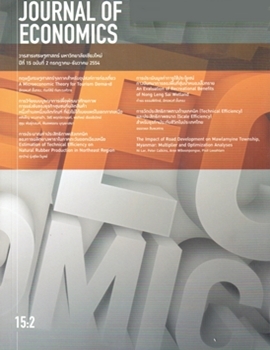การวัดประสิทธิภาพทางด้านเทคนิค (Technical Efficiency) และประสิทธิภาพขนาด (Scale Efficiency) สาหรับธุรกิจประกันชีวิตในประเทศไทย
Keywords:
DEA, ประสิทธิภาพทางด้านเทคนิค, ประสิทธิภาพขนาด, บริษัทประกันชีวิต, Data Envelopment Analysis (DEA), Technical Efficiency, Scale Efficiency, Life – Insurance CompanyAbstract
การวัดประสิทธิภาพทางด้านเทคนิค (Technical Efficiency) และประสิทธิภาพขนาด (Scale Efficiency) ของธุรกิจประกันชีวิตของประเทศไทยในงานวิจัยชิ้นนี้ เป็นการประยุกต์ใช้แบบจาลอง DEA ในการคานวณค่าคะแนนประสิทธิภาพเชิงเทคนิค และประสิทธิภาพขนาดภายใต้ข้อสมมติของการมีผลได้ต่อขนาดคงที่ (Constant Returns to Scale: CRS) และผลได้ต่อขนาดแปรผันแปรผัน (Variable Returns to Scale: VRS) ของหน่วยผลิต โดยในการศึกษาครั้งนี้ ได้ใช้ข้อมูลทางด้านการเงินของบริษัทประกันภัยในช่วงปี พ.ศ. 2550 – 2552 โดยปัจจัยนาเข้า (Inputs) ที่ใช้ในแบบจาลอง DEA ประกอบด้วยตัวแปรทางด้านการเงิน 3 ตัวแปร ได้แก่ ค่าจ้าง และค่าบาเหน็จ ต้นทุนในการดาเนินงาน และค่าใช้จ่ายอื่นๆ และจานวนสาขา ขณะที่ตัวแปรเบี้ยประกันภัยรับสุทธิ และรายได้จากการลงทุน อื่นๆของบริษัทประกันภัย ถูกใช้เป็นตัวแปรผลผลิต (Outputs) ของแบบจาลอง
ภายใต้สมมติฐานของผลได้ต่อขนาดแปรผัน (VRS) ผลการศึกษาพบว่า ในภาพรวม การดาเนินงานของธุรกิจประกันชีวิตยังอยู่ในระดับที่ต่ากว่าประสิทธิภาพ โดยมีค่าคะแนนประสิทธิภาพทางด้านเทคนิคโดยเฉลี่ยในช่วงปี พ.ศ. 2550 – 2552 อยู่ที่ 0.827, 0.844 และ 0.867 ตามลาดับ นอกจากนี้จาก จานวนบริษัทประกันชีวิตทั้งสิ้น 24 บริษัท มีเพียง 14 บริษัทที่มีการดาเนินงานอยู่บนเส้นขอบเขตประสิทธิภาพ และจากจานวนนี้มีเพียง 8 บริษัทเท่านั้นที่มีขนาดการผลิตอยู่ในระดับที่เหมาะสม นอกจากนี้ภายใต้สมมติฐานของผลได้ต่อขนาดคงที่ (CRS) ผลการศึกษาพบว่ามีบริษัทประกันชีวิตเพียง 4 บริษัทจากทั้งหมด 24 บริษัทเท่านั้นที่มีการดาเนินงานอย่างมีประสิทธิภาพตลอดช่วง 3 ปีที่ทาการศึกษา
The measurement of technical and scale efficiency of the life insurance companies in Thailand in this study is one of the application of the linear programming technique called Data Envelopment Analysis (DEA) in computing both efficiency scores under the assumptions of both constant and variable returns to scale (VSR). The study used the latest financial data of insurance companies from 2007 – 2009. The inputs for DEA model in this study consist of three financial variables including total amount of salary and pension paid to employees, cost of operation and miscellaneous expenditures and the number of operating offices, while the net received premiums and revenues from other investments are treated as outputs of the model.
Under the assumption of variable returns to scale (VRS), the results showed that life insurance companies in Thailand are overall inefficient during 2007 – 2009 with average efficiency ratings of 0.827, 0.844 and 0.867, consecutively. Moreover, from the overall 24 life insurance companies, only 14 companies were operating on the efficiency frontier, and only 8 companies from this group are scale efficient. Furthermore, with the assumption of constant returns to scale, the results showed that only 4 life insurance companies from the overall 24 companies were efficiently operated during the 3 – year studying period.
Downloads
Issue
Section
License
All opinions and contents in the CMJE are the responsibility of the author(s). Chiang Mai University Journal of Economics reserves the copyright for all published materials. Papers may not be reproduced in any form without the written permission from Chiang Mai University Journal of Economics.






